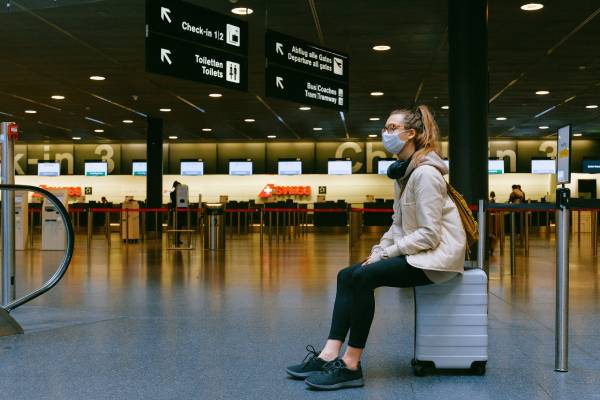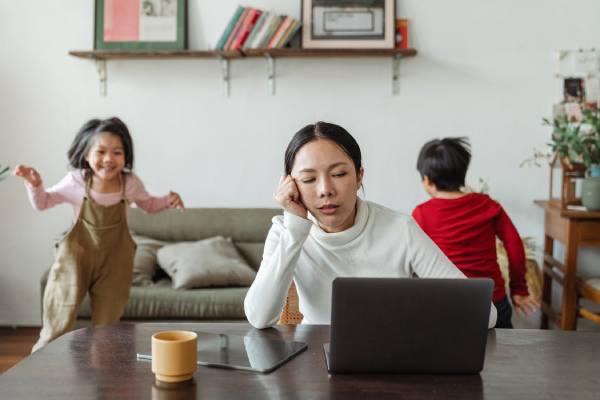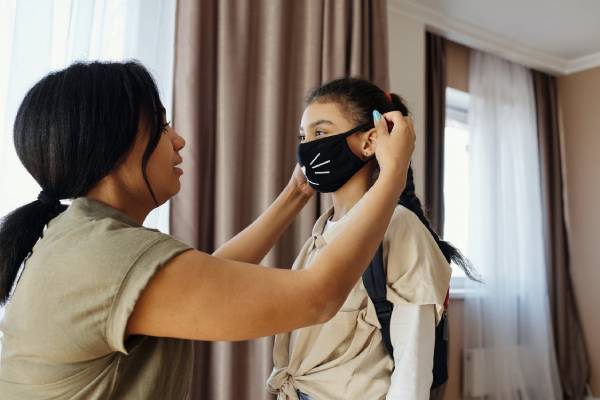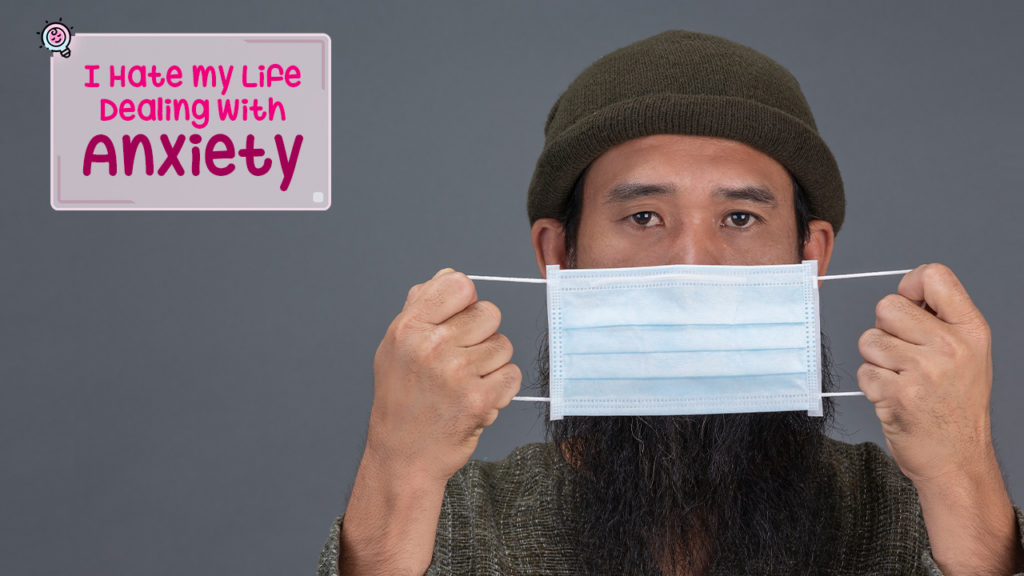I hate my life. So goes a seemingly new normal phrase. The past months have been alarming and traumatic for many people. These pandemic-caused events and situations have triggered stress and discomfort for different families. With so many changes happening in society, hundreds of parents and their kids have to deal with anxiety every day.
Read this parent’s guide to dealing with anxiety during COVID to help lessen the impact of the whole battle.
Read, be informed, and know that you are not alone in this.
Table of Contents
What We Know About COVID

Novel Coronavirus Disease 2019 (COVID-19) was first detected in the last weeks of December 2019. After months of research, experts contributed the health hazard to bats. However, some researchers say that it’s linked to the genes of other exotic animals—making the virus deadly for human beings.
COVID-19 is highly contagious and can spread easily in large crowds. With that, people are encouraged to wear masks and practice social distancing whenever they go out in public. According to an article from the Centers for Disease Control and Prevention (CDC), Coronavirus (COVID-19) spreads through “respiratory droplets or small particles” produced by an infected person. When that person sneezes, coughs, talks, or sings, the particles proliferate in the air, especially if he or she is not wearing any mask or covering.
How Serious Is It?
When someone becomes infected with the disease, he or she develops flu-like symptoms. But with COVID, the effects are more dangerous. Individuals—children, teens, adults, seniors—who have underlying illnesses or medical conditions are more vulnerable to the virus. Hence, people have to be more cautious to avoid contracting this disease.
While the infection rate is relatively high, the majority of those people have recovered. The Imperial College London reports that the COVID-19 infection fatality ratio is 1.15% (high-income nations) and 0.23% (low-income nations). The infection fatality ratio (IFR) is the percentage of deaths among the number of infected groups.
Therefore, even when millions have been infected with the virus, the number of deaths is significantly lower. Presently, different companies have created and rolled out vaccines for the communities.
Why It’s Valid to Say “I Hate My Life” and It’s Okay to Feel Anxious

During this time, feelings of anxiety, misery, and dread come naturally to everyone. Most people grew up surrounded by friends, family, and colleagues. But with the threat of the virus, the social interactions have temporarily stopped. So, anxiety and loneliness are natural reactions that occur to anyone trapped in this situation.
Families are limited to their homes—moving from one room to another, meeting the same faces every day, getting the same conversations throughout the week. It can be an exhausting routine for busy parents and active kids. Sometimes, finding alone time in the household is a task altogether. With all these circumstances coming together, parents will feel anxiety and other negative emotions.
You’re Allowed to Feel Terrified
I hate my life. But really, I’m just so tired and scared.
While all these feelings are happening at the same time, they are valid. The emotions that creep up to you when you’re watching the news or listening to the radio are natural reactions to uncertainties. Instead of ignoring these natural responses, you have to recognize their existence. It’s okay to feel anxious, lonely, or afraid. Embracing your fears does not make you less of a parent or person. Rather, it represents your vigilance to the happenings in your home or neighborhood.

However, you should not let anxiety control your decisions. According to Luana Marques, psychologist and president of the non-profit organization Anxiety and Depression Association of America (ADAA), “anxiety often goes up in any moment where our bodies perceive a real threat.” Perilous circumstances like this pandemic have triggered anxiety breakdowns and social anxiety. When anxious, people become bad decision-makers on a smaller and larger scale. Despite this challenge, Marques confirms that individuals still have the capacity to manage their anxieties even when they’re at home.
Things I Can Control vs. Things I Cannot Control
The changes happening in society altered the lifestyle of many people. The social activities such as partying, beach-outing, mall strolling, and movies night out abruptly stopped. And it took awhile for everyone to accept the new norm; although not every person agrees to the sudden changes.
As parents are stuck at home with their kids—twenty-fours a day, seven days a week—in this crisis, issues on control over certain activities or things erupt. But how does worrying about controlling things affect anxiety? Or does it build anxiety for parents? Raising children is not an easy job. And parents want the best for their kids. So, when things don’t go according to plan, parents become anxious and troubled.
According to HelpGuide, chronic worrying, excessive distress, and intense nervousness are symptoms of Generalized Anxiety Disorder (GAD), a common anxiety disorder. This mental health issue, which is common for people under so much stress and agitation, interferes with the person’s ability to function and make decisions. When someone has GAD, the worry and tension is a burden. No wonder you often find yourself at “I hate my life.”
Knowing the Difference

Now, there are ways to lessen the anxiety, stress, and uncertainties you feel. Aside from breathing techniques and self-help videos, you have to incorporate this guide on things you can and cannot control. But why does it matter? By acknowledging the elements that are within your power and outside your reach, you will learn to slowly let go of things that keep you up all night.
THINGS I CAN CONTROL: my positive attitude towards different activities and people, my kindness, knowing my limitations (social media, interacting, food intake etc.), things that I own, my happiness, books I consume, etc.
THINGS I CANNOT CONTROL: the reactions or actions of other people, the news coverage on television. This includes the attitude of my family, the motives of other individuals. Additionally, we also have the opinion of other people, the duration of the pandemic, etc.
After categorizing the things under “can” and “cannot” control, you can evaluate your stance on the topics or situations. Slowly, you will begin to focus on the things that you can control and let go of things that bring anxiety to your being.
Having a Mantra Helps
I hate my life. But I’m about to change that. I’m about to make sure I never say that again.

Whether it’s about caring for your toddler or handling the moods of your teenage son, you already have a lot on your plate. But now—with the pandemic still moving forward—you have more concerns and issues. So, aside from acknowledging the things you can and cannot control, you should also find a mantra that will help calm the nerves during anxiety attacks or distressing moments.
Chantelle Doswell, a licensed counselor, confirms that using mantras are excellent and helpful techniques to counter anxiety-driven thoughts and actions. Although it’s not the cure for anxiety, it can help your confidence and health. It may look simple, but the power the mind and mouth holds can alter how things will play out in a specific scenario.
How Do You Avoid Saying “I Hate My Life?”
A mantra, often a sound or group of words, is repeated multiple times to increase the concentration of a person. Used in meditation, mantra helps soothe inner struggles of individuals. Importantly, the reverberation of the sound relaxes the person.
We recommend five mantras to help reduce the stress you feel right now. But first, you have to test out the sounds and words to ensure its effects on your mind and body.
Positive affirmation encourages you to be a better version of yourself. And when you’re feeling anxious about the life you have or the future of your kids, always start to think about how far you’ve come and how strong you’ve been for the past months. Don’t start looking at the things you missed over the past weeks, but begin searching for better activities in the future—for better days ahead.
Hear Yourself
Most people, particularly parents, fail to realize the importance of self-care. But why is it crucial? Why do parents need to care for themselves first? In a household, the parents are responsible for the welfare, health, and safety of the children. Hence, the largest chunk of accountability falls on them. Whether it’s about your teenage daughter’s issues with school or your toddler’s need for attention, it becomes your responsibility.
Parents need to be physically, mentally, and emotionally healthy. It should be the combination of these things and not only one part. If the parent is physically weak, he or she cannot perform his or her respective function in the household. That applies to whether it’s caring for an anxious child or listening to a stressed teenager. Therefore, parents have to be well for the comfort and security of the children.
Put Yourself First

But what does self-care look like for parents? Self-care comes in different forms and practices. Ultimately, the exercise centers on rejuvenating the energy and replenishing the soul of the person. For parents, self-care can be anything that will satisfy the body and mind. According to Whitney Casares, registered Medical Doctor, taking time for self is an important component in keeping the parent happy and safe. She stresses that parents need a mental break to recharge the batteries. Even working mothers need self-care routines to maintain their composure.
As the crisis continues, parents can still do self-care practices while at home. For instance, setting time for thirty-minute bubble baths (alone time, of course!) every weekend can be an effective method of self-care. Apart from that, you can also schedule hourly readings of your favorite novels or podcast series. You can spend an hour a day meditating when the kids are sleeping or studying. At lunch, you can cook and eat healthy meals instead of take-outs. All of these activities depend on your available time; so, look at your plans and make time for self-care habits.
Consult Professionals and Seek for Help
I hate my life. But really, I just have to have all the help I need and I can get through this. I WILL.

When some situations are too tough for you, it’s best to seek help and consult professionals. Anxieties can lead to other mental health issues and problems. If you’re at risk because of panic attacks and nervousness, it’s better to ask for help.
There is nothing wrong with asking for help, especially if you’re seeking in the right direction. These experts will provide relevant input that’s beneficial for your health. Overall, consulting someone during moments of unfathomable dread and crisis will lessen the burden.
According to the latest report from BMJ Publishing Group, suicide during the COVID-19 pandemic has risen. One prevalent reason linked to the increase in numbers is the deterioration of mental health. The loss of interaction, lifestyle, and job roles significantly affected the health of everyone. Teens and adults are susceptible to negative emotions and thoughts. Parents should look out for their kids, and the children should also care for their parents.
If things are hard to handle, talk to someone you can trust. Give yourself a break. It’s a difficult day, but it will be better. And if the feeling of discomfort continues, talk to a professional. You don’t have to be alone in the fight.


